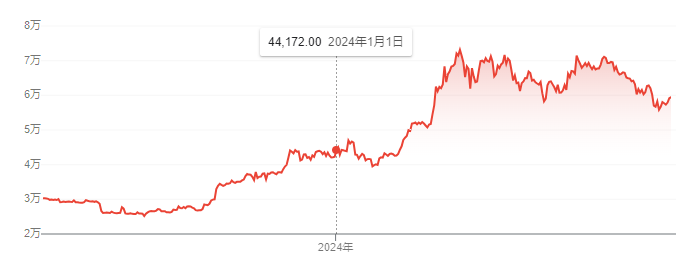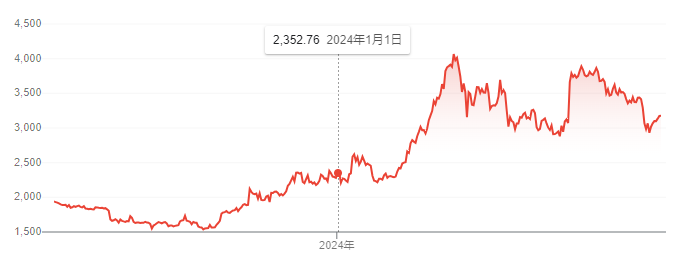For the convenience of readers, some common nouns will be abbreviated as follows:
- Ethereum Spot ETF: abbreviated as "Ethereum ETF" in the following text
- Bitcoin Spot ETF: abbreviated as "Bitcoin ETF" in the following text
- U.S. Securities and Exchange Commission: abbreviated as "U.S. SEC" in the following text
Since 8 asset management institutions planning to issue Ethereum ETF in the U.S. securities market finally submitted the S-1 document to the U.S. SEC in June 2024, whether Ethereum ETF can be successfully issued and when it can be listed for trading has been a concern for industry professionals. Various predictions have been fluctuating, and the market value of ETH has also been fluctuating frequently due to related news. Why does Ethereum ETF arouse such market sentiment? Should we be optimistic and take the first step to enter the market, or should we remain calm and wait and see?
Through ETFs, digital assets are integrating into the mainstream financial trading market
This may be one of the most important market implications of issuing cryptocurrency ETFs.
"You are witnessing the birth of a new asset class," said Matthew Hougan, Chief Investment Officer of Bitwise Asset Management, in an interview with the U.S. media CNBC on July 8, 2024.
Bitwise Asset Management is also one of the issuers planning to issue Ethereum ETF in the U.S. securities market. Matthew Hougan believes that cryptocurrency ETFs are a story that will continue to develop, and the issuance and successful trading status of Bitcoin ETF in January 2024 is a good indicator of future development.
Data published by FactSet shows that the scale of funds attracted by the U.S. Bitcoin ETF has ranked in the top 2 in the 2024 U.S. ETF rankings.
As for the issuance of Ethereum ETF in the U.S. securities market, people also have high expectations for its "fund-attracting power." However, industry professionals generally believe that the scale of funds attracted by Ethereum ETF is expected to be smaller than that of Bitcoin ETF.
However, as an article published on Bankless.com pointed out, the inflow of funds into Ethereum ETF in the first few years may reach several billion U.S. dollars, which is actually a strong start for any ETF.
Matthew Hougan, Chief Investment Officer of Bitwise Asset Management, expressed a more optimistic expectation: "If Ethereum ETF achieves a return of $5 billion, $10 billion, or $15 billion in the first two years after its launch, that would be a huge success."
Currently, in addition to Bitcoin and Ethereum, news of the upcoming issuance of Solana Spot ETF in the U.S. securities market has also been widely reported in early July 2024.
On July 8, 2024, the Chicago Board Options Exchange submitted a 19b-4 document to the U.S. SEC. According to the content of the document, it was confirmed that VanEck and 21Shares, two asset management institutions, plan to list and issue Solana Spot ETF. The U.S. SEC is expected to provide feedback on the 19b-4 document submitted to the Chicago Board Options Exchange within 240 days (expected to be by March 2025).
Why is the issuance of Bitcoin ETF in the U.S. smooth, while the issuance of Ethereum ETF is full of uncertainties?
The main reason is regulatory controversy.
In the U.S. financial regulatory environment, there is still controversy over whether the digital asset ETH on Ethereum is a regular asset or an unregistered security. The determination of this issue is still under dispute. The controversy over the nature of ETH stems from the regulatory game—if ETH is deemed a regular asset, it falls under the regulation of the U.S. Commodity Futures Trading Commission; if ETH is considered to have a staking model on its chain that is consistent with the nature of traditional financial "investment contracts," it may be deemed a security and fall under the regulation of the U.S. SEC.
In the U.S., the issuance of securities requires registration with the U.S. SEC. If ETH is deemed a security and falls under the regulation of the U.S. SEC, it needs to be registered with the regulatory authority before it can be issued and traded. If the issuers of these Ethereum ETFs do not register with the regulatory authority and the issuance of securities does not meet the conditions for exemption from registration, they may face regulatory enforcement actions or sanctions for "issuing unregistered securities" and engaging in non-compliant transactions.
On the other hand, the digital asset BTC on Bitcoin does not face such regulatory challenges due to the absence of staking on its chain, and its asset positioning has a higher level of certainty, thus enabling smooth issuance.
It is worth noting that the U.S. SEC has not yet commented on the "nature of ETH" and "whether Ethereum ETF will be issued," and has not issued any official opinions.

What impact does Ethereum ETF have on Ethereum?
In order to minimize compliance risks, the first batch of asset management institutions planning to issue Ethereum ETF in the U.S. securities market have explicitly stated in their relevant issuance documents that the ETH held in their ETFs will not participate in staking on Ethereum.
Staking on Ethereum began with the merger event on September 15, 2022. At that time, Ethereum completed a major transition from the PoW consensus mechanism to the PoS consensus mechanism. For the formal adoption of the PoS consensus mechanism in Ethereum 2.0, ETH staking is indispensable and has important implications for maintaining the security of the Ethereum mainnet and the growth of ETH's market value.
On one hand, the larger the scale of ETH staked, the more validators join the Ethereum network, leading to a significant increase in the cost and difficulty of hacking attacks on Ethereum, creating a safer environment for on-chain transactions and smart contracts. On the other hand, after the merger, the supply of ETH has decreased, and the scale of gas fees burned exceeds the amount of new ETH issued. In theory, this supply-demand relationship will gradually lead to deflation, which is beneficial for the value appreciation of ETH.
However, at present, due to the rapid surge in the market value of BTC since 2024 and the smooth issuance of Bitcoin ETF, the market value status of ETH in the field of blockchain digital assets also seems to have faced several challenges. Regarding the impact of the issuance of Ethereum ETF on Ethereum, most industry professionals choose to focus on the management of ETH's market value. They predict that if Ethereum ETF is issued, the market value of ETH may experience a significant rebound, surpassing the historical high of $4867.60 set in November 2021.
Zach Pandl, Managing Director of Research at cryptocurrency asset management company Grayscale Investments, has stated to the media that less than 30% of the total supply of ETH is staked, and about 10% of ETH is locked in smart contracts. These factors may reduce the amount of new ETH available for ETF holdings. In this supply-demand relationship, the market value of ETH may be pushed higher.
Some media reports have also pointed out that due to the tight supply and weaker liquidity of ETH compared to BTC, the inflow of U.S. dollars into Ethereum ETF may have a greater impact on the market value of ETH.
This may also be one of the important reasons why most people are eagerly anticipating the rapid listing and issuance of the U.S. Ethereum ETF.
As of the end of June 2024, according to data published by Morningstar Direct, the U.S. Bitcoin ETF has attracted close to $38 billion in fund inflows. Within two months after the issuance of the U.S. Bitcoin ETF, the market value of BTC soared from over $40,000 to a peak of $73,803.25. In comparison, although ETH has shown an upward trend since 2024, it has not reached its previous market value peak.

△ Changes in the market value of BTC from January 1, 2024, to July 14, 2024
Market value unit: USD, Source: Google

△ Changes in the market value of ETH from January 1, 2024, to July 14, 2024
Market value unit: USD, Source: Google
The optimistic expectation is that the market value of ETH will rise. However, due to the large scale of funds in the traditional financial industry's ETFs, according to the establishment and operation of the U.S. Ethereum ETF, the large amount of ETH absorbed by asset management institutions will no longer participate in Ethereum staking. Will this have an impact on the security of Ethereum?
At the same time, if there is a discrepancy between the rewards for staking and the returns from investing in ETFs, will a large number of users who participate in staking for rewards abandon staking? Will the substantial holdings of ETH by asset management institutions without participating in staking essentially interfere with or manipulate the pricing power of ETH? Is this exacerbating another form of centralization? Will it affect the original intention of Ethereum as the "world computer"?
All of this is not certain to happen. Given the global influence and fund absorption capacity of the U.S. securities market, the issuance of the U.S. Ethereum ETF is actually a double-edged sword for the future development and goals of Ethereum.

What can we focus on if the issuance of the U.S. Ethereum ETF is rejected?
In addition to the U.S. securities market, the UK, Hong Kong, and Australia have already joined the ranks of issuing Bitcoin ETFs. The trend of blockchain digital assets integrating into the mainstream financial trading market is increasing.
On April 15, 2024, JPMorgan International Asset Management Limited and Huaxia Fund (Hong Kong) announced that they have received preliminary approval from the Hong Kong Securities and Futures Commission to list and issue the first batch of Bitcoin ETF and Ethereum ETF on the Hong Kong Stock Exchange. Since Hong Kong's regulatory division for blockchain digital assets is very clear, with the regulator being the Hong Kong Securities and Futures Commission, and confirming that blockchain digital assets are not securities, there will be no regulatory uncertainty risks as seen in the U.S. securities market, and the issuers of cryptocurrency ETFs will not have compliance risks of "issuing illegal securities."
On April 30, 2024, the Hong Kong Stock Exchange officially welcomed the first trading day of the Bitcoin ETF and Ethereum ETF. In addition, the Bitcoin ETF and Ethereum ETF issued in Hong Kong are open for physical purchases.
On May 24, 2024, according to real-time news released by Yahoo Finance, Bloomberg cited sources as reporting that the Hong Kong Securities and Futures Commission is considering allowing Ethereum ETF to participate in staking. The sources pointed out that the Hong Kong Securities and Futures Commission has been in discussions with the issuers of cryptocurrency ETFs about participating in staking services through licensed platforms, but the discussions are still ongoing, and there is no clear timetable for a decision. A spokesperson for the Hong Kong Securities and Futures Commission declined to comment on this news.
免责声明:本文章仅代表作者个人观点,不代表本平台的立场和观点。本文章仅供信息分享,不构成对任何人的任何投资建议。用户与作者之间的任何争议,与本平台无关。如网页中刊载的文章或图片涉及侵权,请提供相关的权利证明和身份证明发送邮件到support@aicoin.com,本平台相关工作人员将会进行核查。




